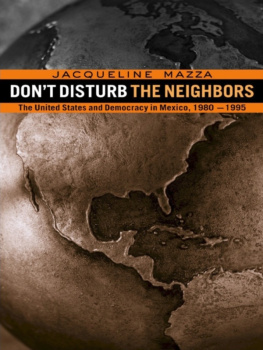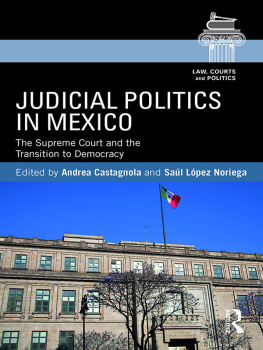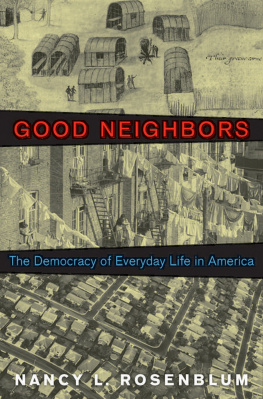Published in 2001 by
Routledge
29 West 35th Street
New York, NY 10001
Published in Great Britain in 2001 by
Routledge
11 New Fetter Lane
London EC4P 4EE
Copyright 2001 by Routledge
A imprint of the Taylor & Francis Group
This edition published in the Taylor & Francis e-Library, 2002.
All rights reserved. No part of this book may be reprinted or reproduced or utilized in any form or by any electronic, mechanical, or other means, now known or hereafter invented, including any photocopying and recording, or in any information storage or retrieval system, without permission in writing from the publishers.
Library of Congress Cataloging-in-Publication Data
Mazza, Jacqueline.
Dont disturb the neighbors : the United States and democracy in Mexico,
19801995 / by Jacqueline Mazza.
p.cm.
Includes bibliographical references.
ISBN 0-415-92304-2 (Print Edition) ISBN 0-415-92305-0 (pbk.)
1. United StatesForeign relationsMexico. 2. MexicoForeign relations United States. 3. United StatesForeign relations1989 . 4. Democracy MexicoHistory20th century. 5. MexicoPolitics and government1988 . I. Title.
E183.8.M6 .M39 2000
327.73072dc21
00032834
ISBN 0-203-90060-X Master e-book ISBN
ISBN 0-203-90064-2 (Glassbook Format)
To my parents,
Frank and Constance Mazza
Preface
Today it is commonplace to hear that the promotion of democracy abroad is one of the fundamental principles of U.S. postCold War foreign policy. Supporting democracy has become the explicit rationale behind key diplomatic and military actions and an extensive program of international assistance. Much of what has been written about U.S. policy looks at those instances when the United States has been explicit about its pro-democracy objectives: for example, when the United States publicly condemns fraudulent elections (e.g., in the Philippines and Panama), leads a multilateral force to reinstall a democratically elected leader (e.g., Haiti), or supports a pro-democracy referendum (e.g., Chile). What interested me, however, were those cases when U.S. policy has not been so explicit. How does this universal U.S. goal apply more broadly in practice? How, or does it, apply to countries in which the United States has compelling economic, political, and security interests, interests that might not always coincide with greater democracy.
This is a book about one such case. For most of the contemporary history between the United States and Mexico, democracy has been a relatively minor issue in bilateral relations. Mexico has long been considered a country where inherent sensitivities to U.S. influence and a complex range of interests, including concern for internal stability, have rendered U.S. support for democracy in Mexico difficult to detect.
Trying to understand how U.S. policy functions without the standard pieces of evidencea big aid program, a major foreign policy action, or even major speechesis a bit like being a blindfolded detective. It is much harder to decipher a policy for which the written record is sparse and about which policymakers are reticent to discuss. Change is more likely in the near future with the inauguration of Mexicos first opposition president in more than seventy years, but sensitivity regarding Mexicos internal politics clearly dominated recent bilateral relations. My hope is to progress from broad generalizations and taboos of the recent past to a better understanding of how this increasingly important aspect of bilateral relations functions.
This book contains the first review of what was said and done by the United States regarding evolving democracy in Mexico during the Reagan administration in 1980 until the peso crisis in 1995, a period during which the United States developed a broad-based policy to support democracy abroad. In addition to a comprehensive review of the public record, this book relies on over sixty interviews of principally American, but also Mexican, officials who were generous with their time and insights when this work was a doctoral dissertation for the Johns Hopkins University, School of Advanced International Studies (SAIS).
My initial review of the public record revealed that the theme of democracy in Mexico arose in the United States largely during periods of key bilateral controversies or events, such as the North American Free Trade Agreement (NAFTA). Outside of such contexts of heightened bilateral controversy, democracy often faded from the bilateral agenda. The book thus provides focused consideration of four periods in which there was a greater spotlight on the issue of democracy in Mexico: (1) the period of high bilateral tension and open criticism of Mexico during the Reagan administration, 19821986; (2) negotiations surrounding the passage of NAFTA, 19891992; (3) the 1994 Mexican presidential elections; and (4) the peso crisis, 19941995. These case studies are presented chronologically within chapters covering each U.S. administration and are linked to the broader evolution of U.S. policy.
There have been many challenges to this topic. First, what is to be studied? What actions, statements, and activities are relevant to a study of democratization policy toward a single country? The book utilizes a list of policy instruments to support democracy developed by Samuel Huntington. He provides six categories of instruments: statements of U.S. officials, economic pressures, diplomatic actions, material support for rebel forces and opposition parties, military actions, and multilateral diplomacy. It is only the instruments of public statements, diplomatic actions, and, in specific instances, political assistance that are relevant to the Mexican case.
More difficult still was deciding to stick narrowly to U.S.-understood terms of promoting democracydemocratic institution-building, free and fair elections, respect for human rights. There are many policies that intersect and are affected by the nature of internal politicsdrugs, corruption, and stability, just to start. There are also indirect U.S. pro-democracy influences through the U.S. media and culture. But to address each of these influences comprehensively would require separate volumes. The book thus sticks more narrowly to explicit U.S. pro-democracy efforts and addresses intersecting policies and influences only as public officials made direct links to Mexican democracy.
A second challenge encountered was examining U.S. policy toward a subjectMexican democratic developmentthat defies easy classification and was advancing during the time period under consideration. To nearly all observers, the Mexican political system during the 1980s and 1990s was liberalizing in important directions and operating with both democratic and antidemocratic elements. Larry Diamond developed a special category, semi-democracy, to classify countries like Mexico, which he saw as largely democratic in structure but authoritarian in practice. This book does not attempt to track the evolution of the Mexican political system or evaluate its political changes; this too is a study in itself. Rather, the book keeps more narrowly to the subject of U.S. policy and public response as the Mexican system evolved.
A third challenge was that, as an examination of recent U.S. policy, this study had to rely largely on public sources and interviews. Access to classified materials was limited to those documents that have been obtained by various sources under the Freedom of Information Act (FOIA) or disclosed in the press. Efforts were made in interviews to probe the distinction between public and private, behind-the-scenes activities of the various administrations, and these observations have been incorporated into the volume. FOIA requests would literally take decades to provide a complete, if there ever could be one, record of private communications. But it must be remembered that it is the public portion of U.S. policy that is the fundamental core of any U.S. policy to support democracy overseas. It is the public policy that constitutes the U.S. governments communication to the opposition and civil society of foreign nations as well as to its own bureaucracy and Congress, which are not privy to private communications. A behind-the-scenes policy can only be so effective if it is not backed up by a credible public policy. Furthermore, the public face of U.S. policy creates a framework from which any private dialogue is duly constrained. As Richard Neustadt explains, The tendency of bureaucratic language to create in private the same images presented to the public should never be underrated. Further, public statements force the policymaker to work with the goals and expectations established by those statements because Congressmen and various aid constituencies do not forget the rhetoric even if the official may want to.









